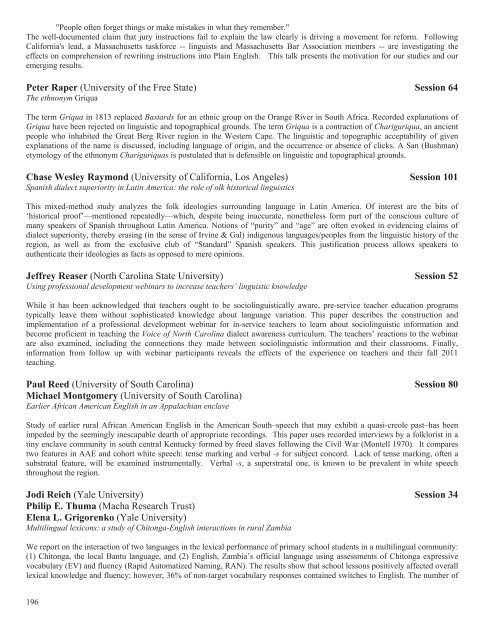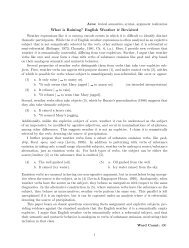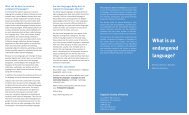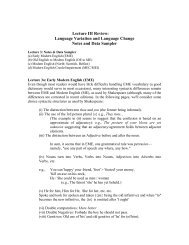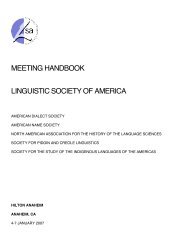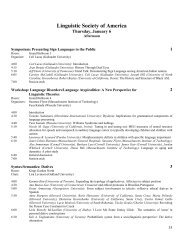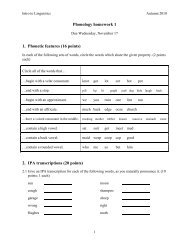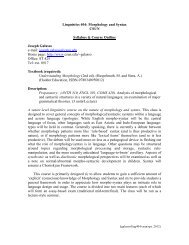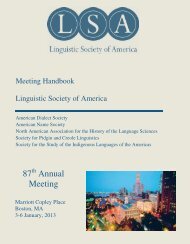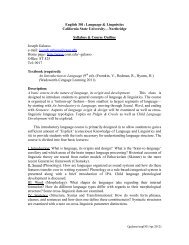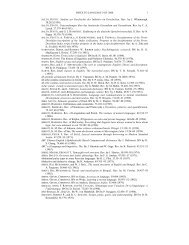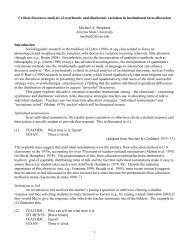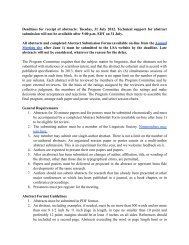here - Linguistic Society of America
here - Linguistic Society of America
here - Linguistic Society of America
You also want an ePaper? Increase the reach of your titles
YUMPU automatically turns print PDFs into web optimized ePapers that Google loves.
"People <strong>of</strong>ten forget things or make mistakes in what they remember."The well-documented claim that jury instructions fail to explain the law clearly is driving a movement for reform. FollowingCalifornia's lead, a Massachusetts taskforce -- linguists and Massachusetts Bar Association members -- are investigating theeffects on comprehension <strong>of</strong> rewriting instructions into Plain English. This talk presents the motivation for our studies and ouremerging results.Peter Raper (University <strong>of</strong> the Free State) Session 64The ethnonym GriquaThe term Griqua in 1813 replaced Bastards for an ethnic group on the Orange River in South Africa. Recorded explanations <strong>of</strong>Griqua have been rejected on linguistic and topographical grounds. The term Griqua is a contraction <strong>of</strong> Chariguriqua, an ancientpeople who inhabited the Great Berg River region in the Western Cape. The linguistic and topographic acceptability <strong>of</strong> givenexplanations <strong>of</strong> the name is discussed, including language <strong>of</strong> origin, and the occurrence or absence <strong>of</strong> clicks. A San (Bushman)etymology <strong>of</strong> the ethnonym Chariguriquas is postulated that is defensible on linguistic and topographical grounds.Chase Wesley Raymond (University <strong>of</strong> California, Los Angeles) Session 101Spanish dialect superiority in Latin <strong>America</strong>: the role <strong>of</strong> olk historical linguisticsThis mixed-method study analyzes the folk ideologies surrounding language in Latin <strong>America</strong>. Of interest are the bits <strong>of</strong>‘historical pro<strong>of</strong>’—mentioned repeatedly—which, despite being inaccurate, nonetheless form part <strong>of</strong> the conscious culture <strong>of</strong>many speakers <strong>of</strong> Spanish throughout Latin <strong>America</strong>. Notions <strong>of</strong> “purity” and “age” are <strong>of</strong>ten evoked in evidencing claims <strong>of</strong>dialect superiority, t<strong>here</strong>by erasing (in the sense <strong>of</strong> Irvine & Gal) indigenous languages/peoples from the linguistic history <strong>of</strong> t<strong>here</strong>gion, as well as from the exclusive club <strong>of</strong> “Standard” Spanish speakers. This justification process allows speakers toauthenticate their ideologies as facts as opposed to mere opinions.Jeffrey Reaser (North Carolina State University) Session 52Using pr<strong>of</strong>essional development webinars to increase teachers’ linguistic knowledgeWhile it has been acknowledged that teachers ought to be sociolinguistically aware, pre-service teacher education programstypically leave them without sophisticated knowledge about language variation. This paper describes the construction andimplementation <strong>of</strong> a pr<strong>of</strong>essional development webinar for in-service teachers to learn about sociolinguistic information andbecome pr<strong>of</strong>icient in teaching the Voice <strong>of</strong> North Carolina dialect awareness curriculum. The teachers’ reactions to the webinarare also examined, including the connections they made between sociolinguistic information and their classrooms. Finally,information from follow up with webinar participants reveals the effects <strong>of</strong> the experience on teachers and their fall 2011teaching.Paul Reed (University <strong>of</strong> South Carolina) Session 80Michael Montgomery (University <strong>of</strong> South Carolina)Earlier African <strong>America</strong>n English in an Appalachian enclaveStudy <strong>of</strong> earlier rural African <strong>America</strong>n English in the <strong>America</strong>n South–speech that may exhibit a quasi-creole past–has beenimpeded by the seemingly inescapable dearth <strong>of</strong> appropriate recordings. This paper uses recorded interviews by a folklorist in atiny enclave community in south central Kentucky formed by freed slaves following the Civil War (Montell 1970). It comparestwo features in AAE and cohort white speech: tense marking and verbal -s for subject concord. Lack <strong>of</strong> tense marking, <strong>of</strong>ten asubstratal feature, will be examined instrumentally. Verbal -s, a superstratal one, is known to be prevalent in white speechthroughout the region.Jodi Reich (Yale University) Session 34Philip E. Thuma (Macha Research Trust)Elena L. Grigorenko (Yale University)Multilingual lexicons: a study <strong>of</strong> Chitonga-English interactions in rural ZambiaWe report on the interaction <strong>of</strong> two languages in the lexical performance <strong>of</strong> primary school students in a multilingual community:(1) Chitonga, the local Bantu language, and (2) English, Zambia’s <strong>of</strong>ficial language using assessments <strong>of</strong> Chitonga expressivevocabulary (EV) and fluency (Rapid Automatized Naming, RAN). The results show that school lessons positively affected overalllexical knowledge and fluency; however, 36% <strong>of</strong> non-target vocabulary responses contained switches to English. The number <strong>of</strong>196


